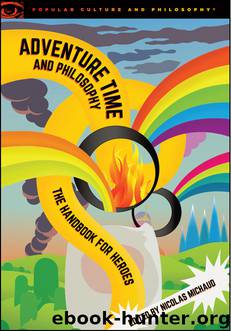Adventure Time and Philosophy by Michaud Nicolas

Author:Michaud, Nicolas [Michaud, Nicolas]
Language: eng
Format: epub
ISBN: 9780812698862
Publisher: Open Court
Figure 1: Lumpy Space Princess the Perceiver, Her Perceptions, and Her Perceived World.
Consider Figure 1. There is Lumpy Space Princess, who is the perceiver. There are her perceptions, which include her sensations, thoughts, and ideas about people, dogs, swords, backpacks, mountains, and other things. Finally, there are the external objects of her perceptions, which include actual people, dogs, swords, backpacks, mountains, and other things out there in the world which her perceptions are supposed to represent.
I Think This House Is a Reflection of Your Sick Brain
But now, there’s a problem, given that there’s me, my perceptions, and the external objects of my perception. Can I really get beyond my own perceptions? Remember, I think I’m sitting at my desk near Lake Michigan. Am I perceiving the screen, keypad, deck, lake, and waves themselves as they really are? Maybe all that I can perceive are my own perceptions?
How can I be sure that the external objects of my perception are really there, or that how they present themselves to me in my perceptions match up with or correspond with how they really are? After all, I can’t step outside of my own perceptions and look at myself in relationship to external objects to see if, in fact, my perceptions correspond with these external objects. Am I “locked inside” my own head? Am I locked in a world of my own world of sense perceptions? If so, how do I know that there is even any world out there beyond my perceptions?
This is at least part of how Marceline felt after she awoke from her sleep spell and how Finn and Jake felt after they discovered they were being tricked in Marceline’s dream. I know it sounds crazy . . . But think about it like this: What if I’m crazy? Remember my hallucination while in the hospital? I know that I can be mistaken about reality. The world sure seems real, but isn’t that exactly how someone having a seriously butt-kicking hallucination would feel?
These questions and problems have caused some thinkers to hold philosophical positions known as epistemological idealism and metaphysical antirealism. Epistemology is the area of philosophy concerned with the sources and justification of knowledge. An epistemological idealist thinks that our perceptions or ideas (idealism) are the only source of knowledge. (I’m talking about philosophical idealism, which has nothing to do with the common understanding of idealism meaning being really dedicated to a noble cause!)
Philosophical idealism means that I can never tell if my perceptions really match up with the external objects of my perception. It’s as if the perceiver is forever barred from access to the objects of perception. Many characters on Adventure Time probably feel this every time one thing morphs into something else, or when a thing shifts to reveal what it really is. Metaphysics is the area of philosophy concerned with the nature and principles of what really exists, and a metaphysical antirealist (or the really hardcore metaphysical realist) thinks that there is no real world outside of her perceptions or ideas.
Download
This site does not store any files on its server. We only index and link to content provided by other sites. Please contact the content providers to delete copyright contents if any and email us, we'll remove relevant links or contents immediately.
Aircraft Design of WWII: A Sketchbook by Lockheed Aircraft Corporation(32275)
The Great Music City by Andrea Baker(31911)
Call Me by Your Name by André Aciman(20484)
The Secret History by Donna Tartt(19023)
The Art of Boudoir Photography: How to Create Stunning Photographs of Women by Christa Meola(18611)
Shoot Sexy by Ryan Armbrust(17720)
Plagued by Fire by Paul Hendrickson(17398)
Portrait Mastery in Black & White: Learn the Signature Style of a Legendary Photographer by Tim Kelly(16996)
Adobe Camera Raw For Digital Photographers Only by Rob Sheppard(16965)
Photographically Speaking: A Deeper Look at Creating Stronger Images (Eva Spring's Library) by David duChemin(16674)
Ready Player One by Cline Ernest(14631)
Pimp by Iceberg Slim(14476)
Bombshells: Glamour Girls of a Lifetime by Sullivan Steve(14046)
The Goal (Off-Campus #4) by Elle Kennedy(13646)
Art Nude Photography Explained: How to Photograph and Understand Great Art Nude Images by Simon Walden(13028)
Kathy Andrews Collection by Kathy Andrews(11801)
The Priory of the Orange Tree by Samantha Shannon(9055)
The remains of the day by Kazuo Ishiguro(8965)
Thirteen Reasons Why by Jay Asher(8881)
